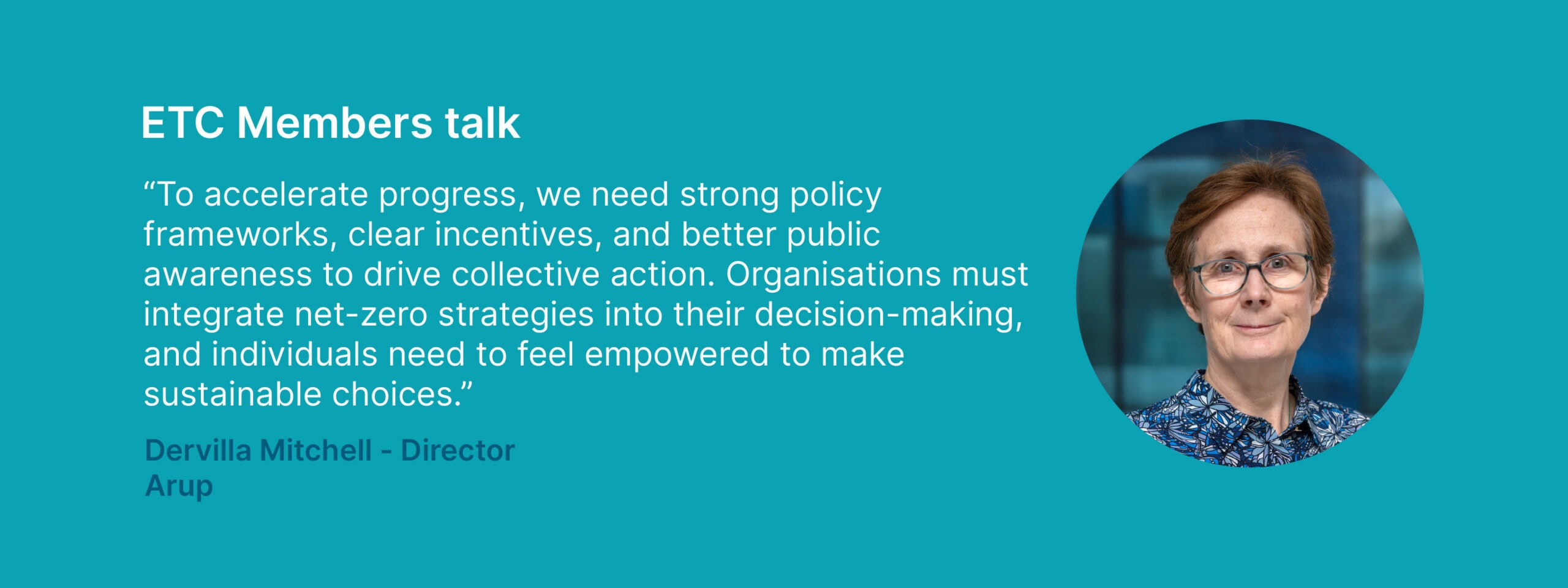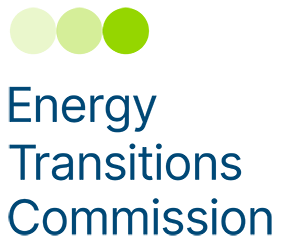Get to know our members and what being part of the ETC means to them. We are pleased to share an exclusive interview with Dervilla Mitchell, Director at Arup.

What drew your organisation to join the ETC?
Arup became part of the ETC to collaborate with a diverse and influential group driving the energy transition. The coalition’s expertise and data-led approach align with our commitment to sustainability and emissions reduction.
Our expertise across the energy, infrastructure and built environment landscape allows us to contribute valuable insights into decarbonising cities, transport, and industry. Whether through advancing net-zero buildings, developing low-carbon infrastructure, or integrating renewable energy solutions, our skills complement the ETC’s efforts to drive systemic change.
We see our membership as both an opportunity to learn from an influential network and a platform to share our own experience in delivering practical, scalable solutions. By working together, we can help drive the transformation needed across sectors to reduce emissions and create a more sustainable future.
What do you see as the ETC’s most impactful achievement since you’ve been a Commissioner?
The ETC’s greatest impact comes from its ability to take a global perspective while grounding its recommendations in robust data and analysis, developing cross-industry actionable strategies for decarbonisation. A key example of this is the recently published Achieving Zero-Carbon Buildings comprehensive report, to which Arup contributed. This report outlines the urgent steps needed to eliminate fossil fuels from buildings, scale up low-carbon materials, and improve energy efficiency—critical areas where rapid progress is required.
By setting clear, data-driven pathways for both policymakers and industry leaders, the ETC helps turn ambition into action. Its influence extends across sectors, shaping policies, investment strategies, and industry practices to accelerate the transition to net zero. Through its rigorous analysis and collaborative approach, the ETC continues to drive tangible progress in tackling the most challenging aspects of decarbonisation.
What do you see as the biggest obstacle on the journey to net-zero?
One of the biggest obstacles to achieving net zero is the lack of broad engagement and urgency across all sectors. Decarbonisation is a complex challenge, and while no single organisation or government has all the answers, inaction is not an option. A major barrier is failure to gain broad engagement on the topic and for organisations and individuals to think they cannot or do not need to make changes to address climate change.
To accelerate progress, we need strong policy frameworks, clear incentives, and better public awareness to drive collective action. Organisations must integrate net-zero strategies into their decision-making, and individuals need to feel empowered to make sustainable choices.
What are the key milestones you see on the road to net-zero, and why?
Rather than firm tangible milestones, the journey to net zero will be shaped by key enablers that drive systemic change.
Strong national and international regulations, standards, and codes of practice are essential to setting benchmarks and accelerating progress.
Consistent and transparent measurement of embodied carbon across the entire lifecycle of products and projects is another critical step. Without a common approach to tracking emissions, it is difficult to make meaningful reductions or hold industries accountable.
From a built environment perspective, I know we can eliminate fossil fuel use in buildings, optimise designs for efficiency, and integrate smart systems and passive solutions to reduce energy demand. By embedding these principles into every stage of design and construction, we can significantly reduce emissions and drive the transition toward a net-zero future.
What is the one necessary change you feel most personally passionate about in the transition journey?
The change I’m most passionate about is making the case for addressing climate change to the public in a way that motivates and empowers individuals to take action. While governments and businesses play crucial roles, meaningful progress will only happen if everyone understands their role in the transition and feels empowered to make choices that contribute to a sustainable future.
By increasing awareness and providing the tools for individuals to make informed, sustainable choices, we can create a culture where sustainability is the default. This shift in mindset is essential to driving the collective action needed to tackle climate change.


